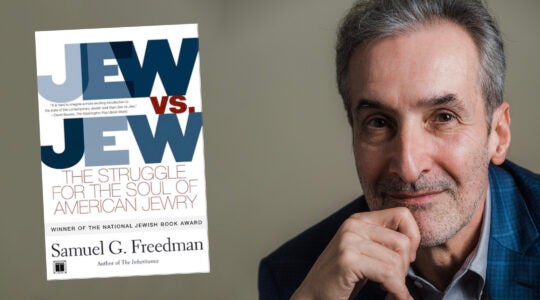A dozen middle-aged to elderly Israelis, some blind, some deaf, some both, baking bread. It is not the most promising theatrical concept, but it works.
Rabbinical students from Yeshivat Chovevei Torah and Yeshivat Maharat attended a recent performance of Not By Bread Alone at the NYU Skirball Center for the Performing Arts, staged by the Nalaga’at Theater, an Israeli company made up of the deaf-blind. It came towards the end of a week devoted to learning about disability. Every other year the yeshiva spends a week examining the issue, alternating between developmental and learning, and as in this year, physical disability. The program is sponsored by Shelley and Ruvan Cohen, in memory of their son Nathaniel, who had Duchenne muscular dystrophy and died as a young man a few years ago. Shelley Cohen also played a leading role in organizing and presenting the week’s program.
For me, the week was a paradigm shift. We all know that there are people within our communities with disabilities, and we all know that provision should be made. But how often do we walk up a flight of stairs into a synagogue building or its sanctuary without noticing the absence of a ramp? Have we ever wondered why we have never seen a person with a mobility disability receive an aliyah? Is it because no such people exist, or because they cannot approach the Torah with dignity? Do our synagogues have Braille siddurim and chumashim (Bibles)? Is a signer available if a deaf congregant wants to attend a shiur, or class? Every day we call God ‘hamelamed Torah le’amo Yisrael’ – the One who teaches Torah to His people, Israel’, yet we deny access to God’s Torah to the many members of our communities.
An estimated 20 percent of the Jewish community has a disability, which means that we all have a connection, as a person with disabilities ourselves, a close family member, rabbi or teacher, classmate or fellow congregant. This issue is of pressing importance to each and every one of us. We shall make progress once we realize that this is not a case of ‘them and us’; of ‘us’ making an extra effort to include ‘them’ in ‘our’ community, but is instead a matter of crafting the institutions and facilities of a community so that they serve all of its members.
The YCT and Maharat students heard from a great variety of experts during our week of study. First and foremost, there was an emphasis on ‘nothing about us without us.’ We began with a panel of three Jews with a range of disabilities all of whom have been involved in breaking down barriers. They gave us an analysis from the perspective of those most directly involved.
It was clear that understanding, respect and a commitment to treating everyone with dignity exists in some places and among some people, but has been lacking amongst others. Insensitivity, an absence of imagination and a wilful lack of consciousness have made minor practical difficulties into major problems, which left people with disabilities disadvantaged and feeling disregarded.
We were challenged by rabbis, educators, ethicists, occupational therapists, psychologists and by textual study and role-play to think about disability in new ways. What is a life worth living? By whose criteria and in whose judgement? How do we handle the halachic and practical challenges to a full-married life when one or both partners have a disability? How do the classical texts and the chain of halachic authorities understand the category of heresh (deaf-mute)? What is the balance between an inclusive and a decorous service? How can we answer a congregant asking the most fundamental questions of theodicy: Why did God do this to me or to my child? We saw examples of how inclusivity can work on the ground, how it benefits everyone involved, whether they have a disability or not.
There was no shying away from the harsh realities of life with a disability. There are challenges and yes, limitations. People with disabilities sometimes need help. The actors on Thursday night described their wish to do more, whether it was to see their new nephew’s face or just to watch television. That will never be possible. They are, however, on an international theatrical tour. But what became clear over the course of the week, is that the ‘hidden treasure’, to quote Rabbi Esriel Hildesheimer about a deaf-mute, can be accessed. The potential of people with disabilities need not be blocked by physical challenges if the right provisions are made, accompanied by training, awareness and commitment.
As the students at YCT and Maharat move towards positions of communal responsibility, weeks such as this one, listening, learning, engaging, are essential to creating a generation of Jewish religious leaders who are know what needs to happen, and how to make it happen. In two years we will spend a week learning about mental disability. The work continues.
Ben Elton is a second year rabbinical student Yeshivat Chovevei Torah.
The New York Jewish Week brings you the stories behind the headlines, keeping you connected to Jewish life in New York. Help sustain the reporting you trust by donating today.




